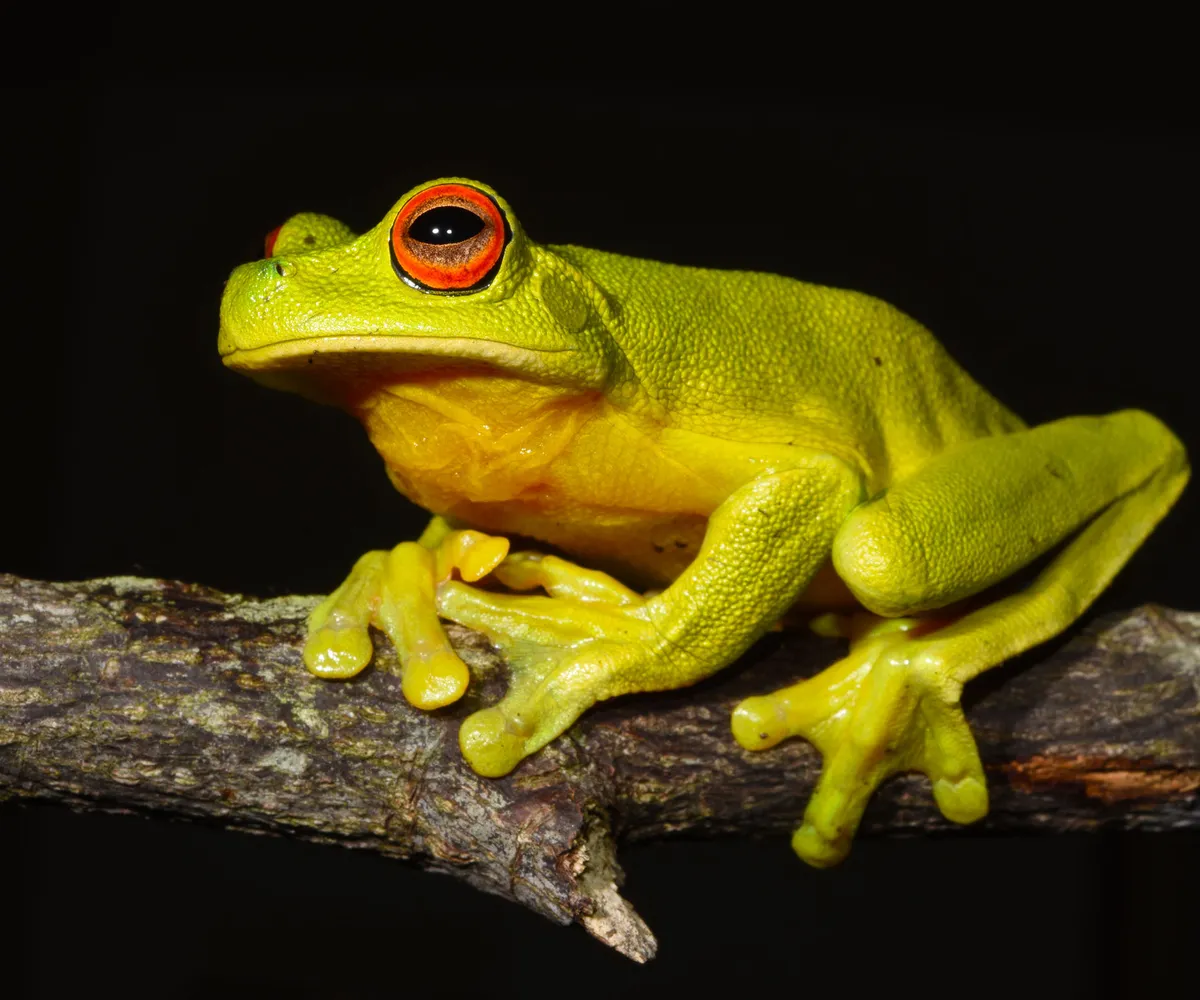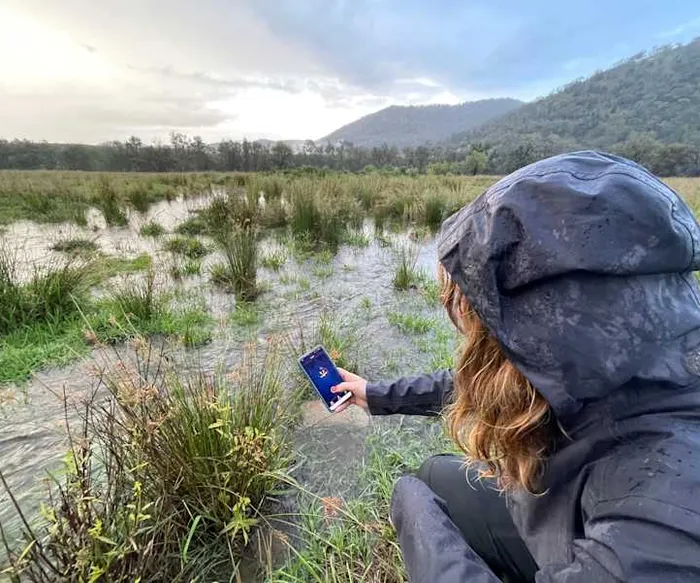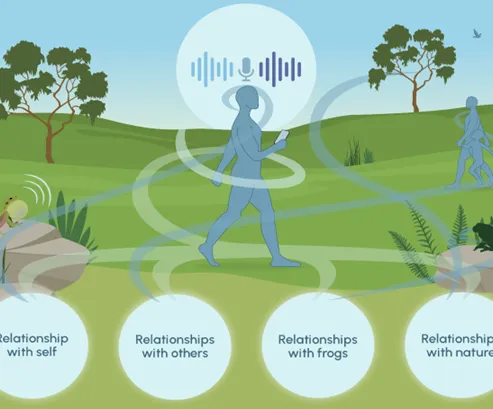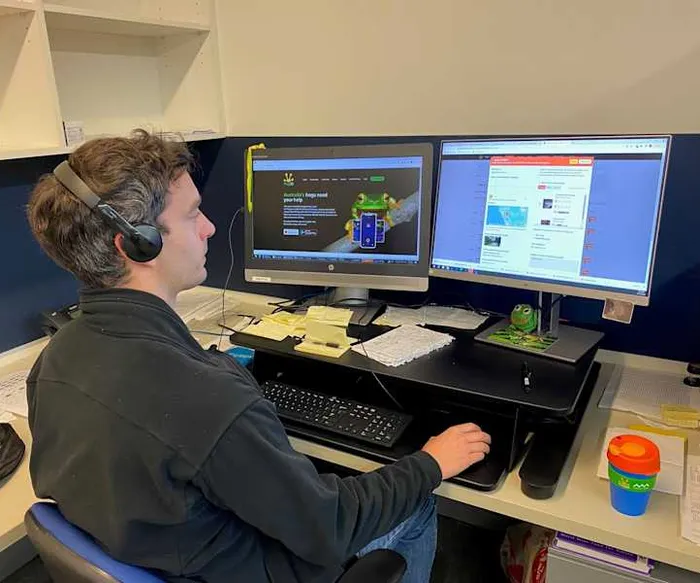Science

Scientific Outcomes of FrogID
Thanks to the contributions of FrogID users across Australia, this growing database of biodiversity records and audio recordings has become an unparalleled information resource on Australia’s frogs. FrogID has allowed us to better understand the true species diversity, distribution and breeding habitats of Australian frogs with a geographic coverage and spatial, temporal and taxonomic accuracy never before possible. Monitoring frog presence at sites over time is also helping us understand how frogs and their ecosystems are responding to a changing planet- from fires, droughts, floods and urbanisation.
Frog die-off across Australia
Since winter 2021, the Australian Museum’s Herpetology department has been working closely with Australian Registry of Wildlife Health and government biosecurity and environment agencies to understand the scale of the mass frog deaths across Australia, leading the research to understand the likely causes.
If you observe a sick or dead frog, please email your observation (including photos and location information, if possible) to the Australian Museum’s FrogID team at calls@frogid.net.au.
We appreciate your important reports of sick and dead frogs, as well as your FrogID submissions through the FrogID app. Together, we are gathering the information we need to help conserve our unique frogs.
Latest Scientific News
FrogID dataset 6.0
The FrogID dataset version 6.0 has been released for download and can be accessed from the FrogID website. It will also be shared with the Atlas of Living Australia and state wildlife atlases across Australia.
This dataset spans the first six years of the project, from 10 November 2017 to 9 November 2023, and includes 974,700 records of 226 species, approximately 88% of the known frog species in Australia. We follow ethical data publication guidelines and consider certain records as sensitive, thereby reducing geolocation accuracy in our publicly available dataset, taking into account the conservation status of the species, whether the species is highly range-restricted, and whether the record falls within the known geographic range of these species. Updates to the dataset are anticipated on an annual basis.
For a more detailed overview of methodology and design aspects, see Rowley et al. (2019), and for metadata associated with this dataset, see Rowley & Callaghan (2020).
Publications
2024
- Purser, W.A., Doughty, P., Rowley, J.L., Böhme, W., Donnellan, S.C., Anstis, M., Mitchell, N., Shea, G.M., Amey, A., Mitchell, B.A., Catullo, R.A. (2024). Systematics of the Little Red Tree Frog, Litoria rubella (Anura: Pelodryadidae) full text
- Gallagher, R., Roger, E., Packer, J., Slatyer, C., Rowley, J.J.L, Cornwell, W., Ens, E., Legge, S., Simpfendorfer, C., Stephen, R., Mesaglio, T. (2024). Incorporating citizen science into IUCN Red List assessments, Conservation Biology full text
- Moon, K., Yates, S., Callaghan, C. T., & Thompson, M. (2024). The relational nature of citizen science. People and Nature full text
- Gillard, G.L, Flemons, P.K.J, Roslan, N., Woods, A. and Rowley, J.J.L. (2024). What’s That Frog? Evaluating a Crowdsourced Approach to Species Identification From Audio Recordings. Citizen Science: Theory and Practice full text
- Elliott-Tate, J. & Rowley, J.J.L. (2024). Unravelling male advertisement call variability in the brown tree frog (Litoria ewingii) complex by using citizen science. Australian Journal of Zoology full text
- Parkin, T., Rowley, J.J.L, Gillard, G., Sopniewski, J., Shea, G.M. & Donnellan, S.C. (2024). Systematics and taxonomy of the Northern Banjo Frog (Anura: Limnodynastidae: Limnodynastes terraereginae) and allied taxa. Ichthyology and Herpetology full text
- Parkin, T., Rowley, J.J.L, Elliot-Tate, J., Mahony, M., Sumner, J., Melville, J. & Donnellan, S.C. (2024). Systematic assessment of the brown tree frog (Anura: Pelodryadidae: Litoria ewingii) reveals two endemic species in South Australia. Zootaxa full text
2023
- Mitchell, B.A, Gorta, S.B.Z, Callaghan, C.T, Kingsford, R.T, Rowley, J.J.L, (2023) Fighting the flames: site specific effects determine species richness of Australian frogs after fire. Wildlife Research full text
- Parkin, T., Donnellan, S.C, Parkin, B., Shea, G.M., Rowley, J.J.L. (2023). Phylogeography, hybrid zones and contemporary species boundaries in the south-eastern Australian smooth frogs (Anura: Myobatrachidae: Geocrinia). Molecular Phylogenetics & Evolution full text
- Donnellan, S., Catullo, R., Rowley, J.J.L., Doughty, P., Price, L., Hines, H.B., Richards, S.J. (2023). Revision of Litoria rothii (Anura: Pelodryadidae) from northern Australia. Zootaxa. full text
- Malerba, M.E., Rowley, J.J.L., Macreadie, P., Frazer, J., Wright, N., Zaidi, N., Nazari, A., Thiruvady, D., Driscoll, D. (2023). Conserving nature’s chorus: local and landscape features promoting frog species richness in farm dams. Biological Conservation. full text
- Scheele, B.C., et al (2023). An invasive pathogen drives directional niche contractions in amphibians. Nature Ecology and Evolution. full text
- Rowley, J.J.L. & Callaghan, C.T. (2023). Tracking the spread of the eastern dwarf tree frog (Litoria fallax) in Australia using citizen science. Australian Journal of Zoology. full text
- Gillard, G.L. & Rowley. J.J.L. (2023). Assessment of the acoustic adaptation hypothesis in frogs using large-scale citizen science data. Journal of Zoology. full text
- Callaghan, C.T., et al. (2023). Experimental evidence that behavioral nudges in citizen science projects can improve biodiversity data, BioScience. full text
- Thompson, M.M., et al. (2023) Citizen science participant motivations and behaviour: Implications for biodiversity data coverage. Biological Conservation. full text
2022
- Thompson, M.M., Poore, A.G.B., Rowley, J.J.L., & Callaghan, C.T. (2022) Citizen Science reveals meteorological determinants of frog calling at a continental scale. Diversity and Distributions. full text
- Cutajar, T. P., and Rowley, J. J. L. (2022) The Utility of Acoustic Citizen Science Data in Understanding Geographic Distributions of Morphologically Conserved Species: Frogs in the Litoria phyllochroa Species Group. Journal of Herpetology. full text
- Liu, G., Kingsford, R. T., Callaghan, C. T., Rowley, J. L. (2022) Anthropogenic habitat modification alters calling phenology of frogs, Global Change Biology. full text
- Cutajar, T.P., Portway, C.D., Gillard, G.L., and Rowley, J.L. (2022). Australian Frog Atlas: Species' Distribution Maps Informed by the FrogID Dataset. Technical Reports of the Australian Museum Online. full text
2021
- Rowley, J.J.L., Mahony, M.J., Hines, H.B., Myers, S., Price, L.C., Shea, G.M. & Donnellan, S.C. (2021). Two new frog species from the Litoria rubella species group from eastern Australia. Zootaxa. full text
- Callaghan, C.T., Liu, G., Mitchell, B., Poore, A.G.B., Rowley, J.J.L. (2021) Urbanization negatively impacts frog diversity at continental, regional, and local scales, Basic and Applied Ecology. full text
- Liu, G., Rowley, J.J. L., Kingsford, R.T., Callaghan, C.T. (2021) Species' traits drive amphibian tolerance to anthropogenic habitat modification. Global Change Biology. full text
2020
- Callaghan, C.T. & Rowley, J.J.L. (2020). A continental assessment of diurnality in frog calling behaviour. Austral Ecology. full text
- Weaver, S.J., C.T. Callaghan, J. J. L. Rowley (2020) Anuran accents: Continental‐scale citizen science data reveal spatial and temporal patterns of call variability, Ecology and Evolution. full text
- Rowley, J.J.L., Callaghan, C.T., Cornwell, W.K. (2020) Widespread short-term persistence of frog species after the2019–2020 bushfires in eastern Australia revealed by citizenscience. Conservation Science and Practice. full text
- Callaghan, C.T., et al. (2020). Citizen science data accurately predicts expert-derived species richness at a continental scale when sampling thresholds are met. Biodiversity and Conservation. full text
- Mitchell, B.A., Callaghan, C.T., Rowley, J.J.L. (2020). Continental-scale citizen science data reveal no changes in acoustic responses of a widespread tree frog to an urbanisation gradient. Journal of Urban Ecology. full text
- Rowley, J.J,L., Callaghan, C.T. (2020) The FrogID dataset: expert-validated occurrence records of Australia’s frogs collected by citizen scientists. ZooKeys. full text
2019
- Rowley, J.J.L., et al (2019). FrogID: Citizen scientists provide validated biodiversity data on frogs of Australia. Herpetological Conservation and Biology. full text
Request for collaborations or non-public data
If you would like to collaborate or would like to request additional data not currently publicly available, please contact research@frogid.net.au and request an ‘Application to Conduct Research or Provide Data’ form
Requests will be reviewed by one or all members of the Scientific Reference Committee on a case by case basis, they will be assessed based on the strength of the proposed research activity and overlap with existing research projects. A licence agreement form will be provided to the researcher for signing once the application has been assessed as successful.
Please note: due to high levels of demand, and our small team size, it is not possible to fulfill all requests. A fee may apply for requests for specialised data and specialist expertise.
FrogID Scientific Advisory Group
The FrogID Scientific Advisory Group provides advice on non-collaborative requests for a large volume of data not currently in the public dataset (ie. sensitive species locations, audio files) or those that will take a significant amount of staff time to fulfil. The group may also provide advice on other aspects of the FrogID project including scientific research priorities, increasing the utility of FrogID data to inform land-use and conservation, and other FrogID initiatives.
Current members
- Dr Jodi Rowley (Australian Museum & UNSW Sydney)
- Nadiah Roslan (Australian Museum)
- Dr Corey Callaghan (UNSW Sydney)
- Emeritus Professor Ross Alford (James Cook University)
- Dr David Hunter (NSW Department of Planning, Industry and Environment)
Recommended citation
FrogID Primary Reference:
- Rowley, J.J.L., Callaghan, C.T., Cutajar, T., Portway, C., Potter K., Mahony, S, Trembath, D.F., Flemons, P. & Woods, A. (2019). FrogID: Citizen scientists provide validated biodiversity data on frogs of Australia. Herpetological Conservation and Biology 14(1): 155-170.
To cite data retrieved from the FrogID website:
- FrogID (2020). FrogID. Australian Museum, Sydney. Available: http://www.frogid.net.au (Accessed: Date [e.g., 1 January, 2020]).




























